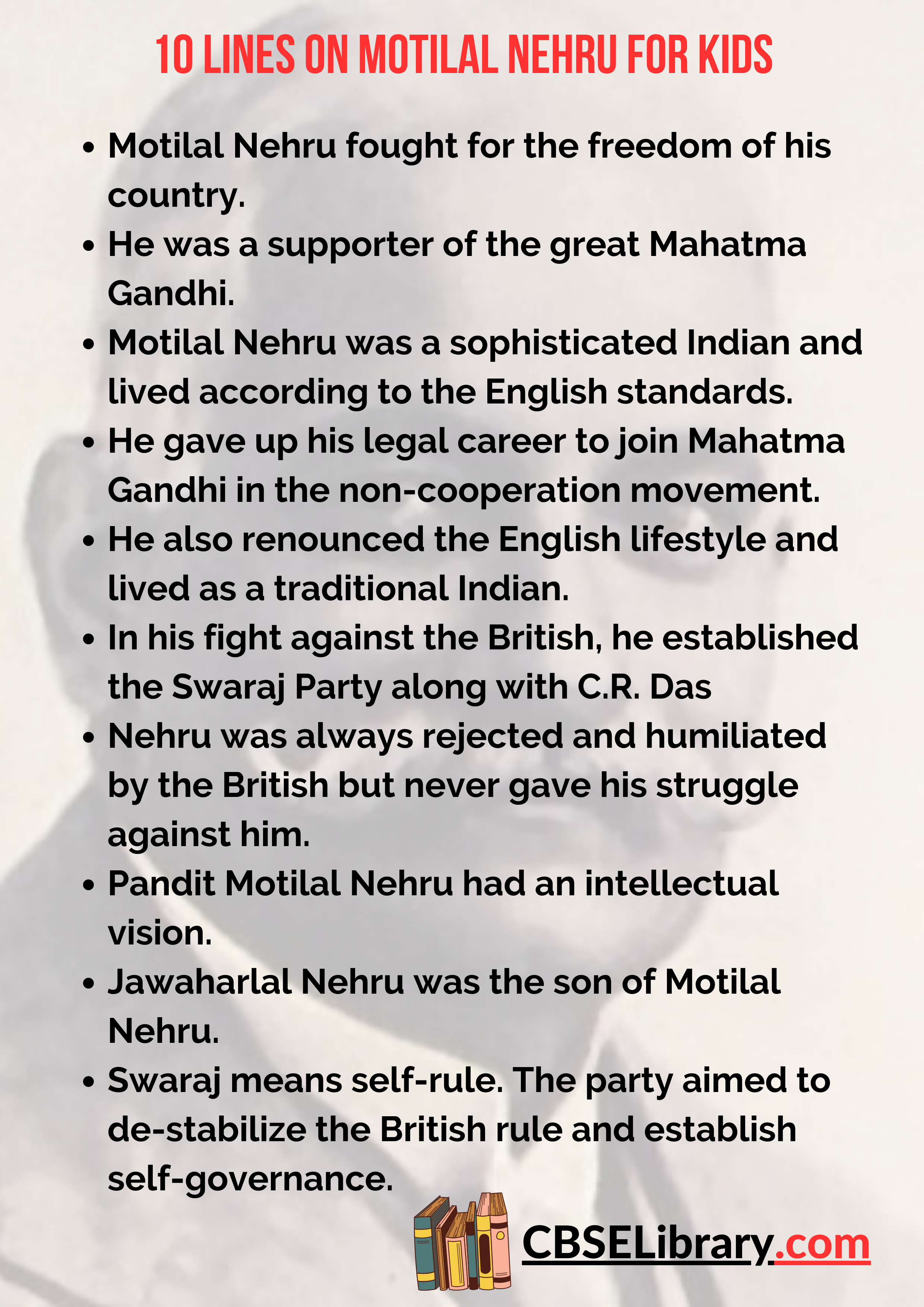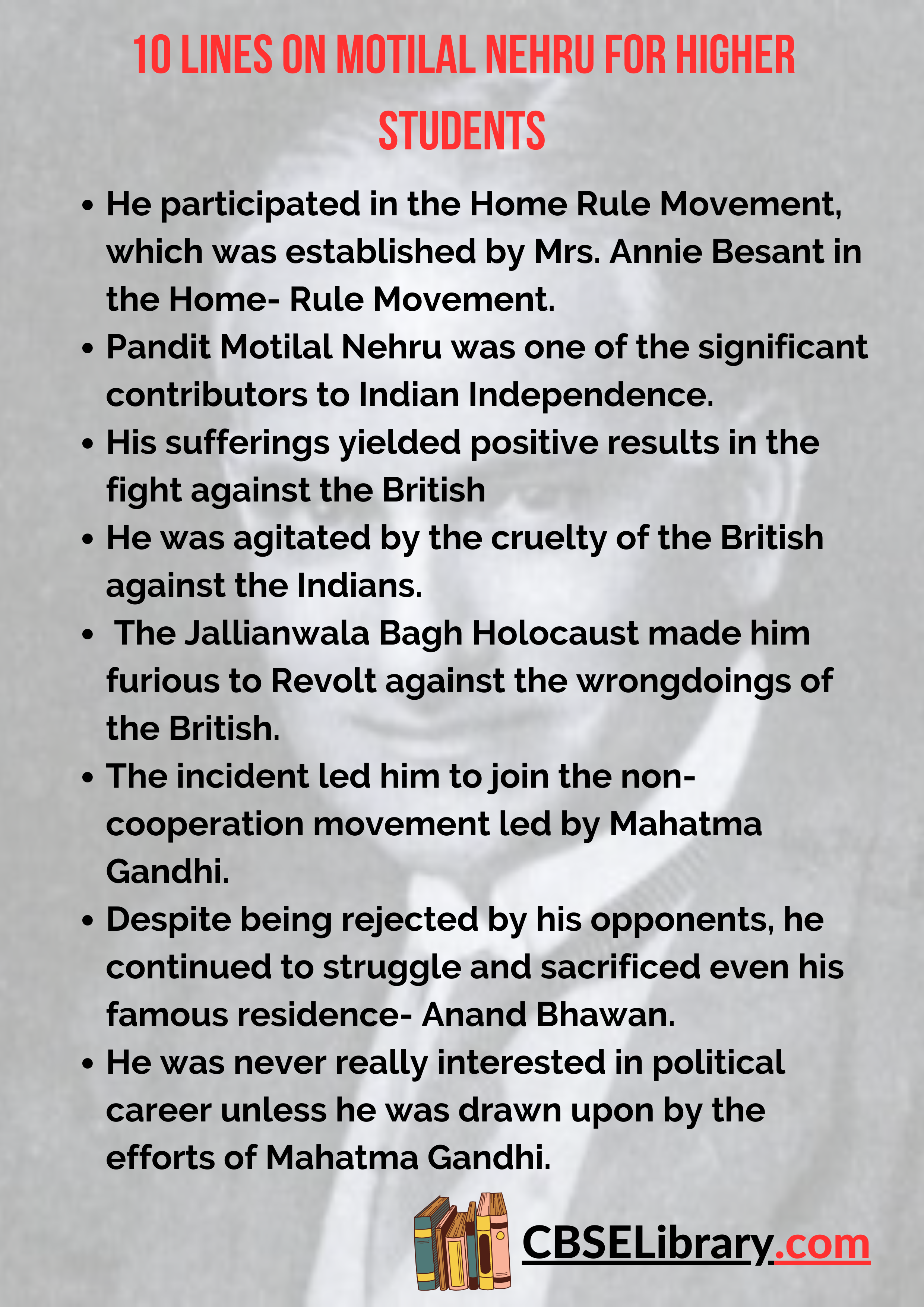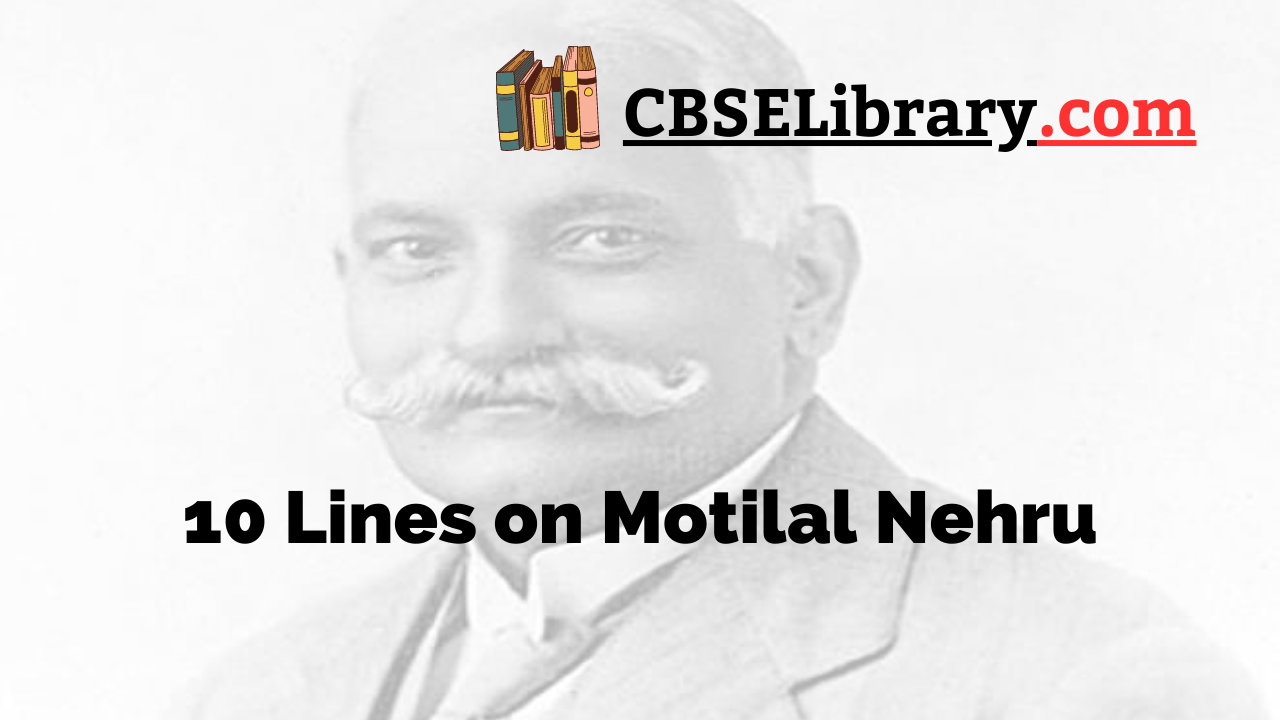10 Lines on Motilal Nehru: Indians have remained slaves to the British for almost a century. Nearly every Indian was forced to worship them as Gods. The invaders easily brainwashed the illiterate Indians, and nobody came forward to fight for several decades. It was only after the introduction of education when few Indians became educated. They became enlightened about the cruel British policies that were imposed on the Indians. These Indians gathered the courage to come into the limelight and inform their fellow Indians about what is happening with them. Mahatma Gandhi, Jawaharlal Nehru, and Motilal Nehru were among the few educated Indians.
You can read more 10 Lines about articles, events, people, sports, technology many more.
Set 1 – 10 Lines on Motilal Nehru for Kids
Set 1 is helpful for students of Classes 1, 2, 3, 4 and 5.
- Pandit Motilal Nehru had an intellectual vision.
- Jawaharlal Nehru was the son of Motilal Nehru.
- Motilal Nehru fought for the freedom of his country.
- He was a supporter of the great Mahatma Gandhi.
- Motilal Nehru was a sophisticated Indian and lived according to the English standards.
- He gave up his legal career to join Mahatma Gandhi in the non-cooperation movement.
- He also renounced the English lifestyle and lived as a traditional Indian.
- In his fight against the British, he established the Swaraj Party along with C.R. Das
- Swaraj means self-rule. The party aimed to de-stabilize the British rule and establish self-governance.
- Nehru was always rejected and humiliated by the British but never gave his struggle against him.

SEt 2 – 10 Lines on Motilal Nehru for School Students
Set 2 is helpful for students of Classes 6, 7 and 8.
- Motilal Nehru was an essential figure in the existence of the Indian National Congress.
- Motilal Nehru was the first president of the Indian National Congress.
- Besides being a famous freedom fighter, he was a lawyer who remained firm on his advocacy.
- Motilal Nehru was a liberal Indian and was adversely criticized by his fellow Indians for rejecting the unreasonable religious rites.
- He adopted the British lifestyle and crossed the oceans, which were against the Hindu norms.
- After witnessing the injustices done to his fellow Indians at the hands of the British, he decided to aide Mahatma Gandhi in the non-cooperation movement.
- His fury led him to give up his legal career and even denounce the British lifestyle.
- He spent his remaining life in the service of his people.
- He fought for the people of his country.
- He was humiliated by the British but continued his freedom struggle.
Set 3 – 10 Lines on Motilal Nehru for Higher Students
Set 3 is helpful for students of Classes 9, 10, 11, 12 and Competitive Exams.
- Motilal Nehru was a liberal Indian and lived according to the British standards.
- He was never really interested in political career unless he was drawn upon by the efforts of Mahatma Gandhi.
- He participated in the Home Rule Movement, which was established by Mrs. Annie Besant in the Home- Rule Movement.
- Pandit Motilal Nehru was one of the significant contributors to Indian Independence.
- His sufferings yielded positive results in the fight against the British
- He was agitated by the cruelty of the British against the Indians.
- The Jallianwala Bagh Holocaust made him furious to Revolt against the wrongdoings of the British.
- The incident led him to join the non-cooperation movement led by Mahatma Gandhi.
- He framed the Nehru report in 1928 that consisted of the dominant status of Indians on India and their fundamental rights. The story was rejected by the British.
- Despite being rejected by his opponents, he continued to struggle and sacrificed even his famous residence- Anand Bhawan.

FAQ’s on 10 Lines on Motilal Nehru
Question 1.
Where Motilal Nehru was born?
Answer:
Nehru was born in Kashmir, but his family moved to Delhi soon after his birth.
Question 2.
How was his early life?
Answer:
Motilal Nehru’s father was a police officer. Gangadhar Nehru’s father was Vakil in East India Company at the Mughal Court of Delhi. Motilal’s parents were killed in the mutiny, after which he moved to Khetri, the second-largest feudal estate in the princely state of Jaipur. He had spent his entire childhood there.
Question 3.
The career life of Motilal Nehru-
Answer:
Nehru was a successful student and became a lawyer in Kanpur. He shifted tp Allahabad three years later, where his brother Nandlal practiced lucratively in the High Court. He then gave up a legal career and focussed more on the Revolt.
Question 4.
When did Motilal Nehru die?
Answer:
Motilal Nehru passed away on 6th February 1931 after the launch Civil Disobedience Movement.
